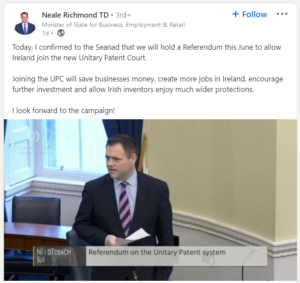Ireland will hold a referendum on joining of the Unified Patent Court in June. This has been confirmed by the Irish government.
 In a post on LinkedIn, Neale Richmond, minister of state for business, employment and retail, announced: ‘Today, I confirmed to the Seanad that we will hold a Referendum this June to allow Ireland join the new Unitary [sic] Patent Court.
In a post on LinkedIn, Neale Richmond, minister of state for business, employment and retail, announced: ‘Today, I confirmed to the Seanad that we will hold a Referendum this June to allow Ireland join the new Unitary [sic] Patent Court.
Joining the UPC will save businesses money, create more jobs in Ireland, encourage further investment and allow Irish inventors enjoy much wider protections.
I look forward to the campaign!’
The Irish government issued a press release:
‘The Government has today (23rd January) approved a proposal to hold a constitutional referendum in June on Ireland’s participation in the Unified Patent Court. (…) The Government has also approved the priority drafting of a Bill to give effect to the proposed constitutional amendment. (…)
An amendment to Article 29 of the Constitution to add the UPC Agreement as an international agreement to the Constitution would be required before Ireland could join the UPC, as it entails a transfer of jurisdiction in patent litigation from the Irish courts to an international court.
The General Scheme of the Bill proposes to insert a new subsection 11 in section 4 of Article 29, providing that the State may ratify the Agreement on a Unified Patent Court signed at Brussels on February 19, 2013.
Following the passage of the legislation through the Houses of the Oireachtas, An Coimisiún Toghcháin, the Electoral Commission is responsible for explaining each referendum proposal in an independent and impartial way. It is also its role to promote public awareness of referendums and to encourage people to vote.’
Exact date to be decided
The referendum will be held alongside local and European elections. The latter take place from 6 to 9 June 2024. On which date Ireland will go to the ballot remains to be decided.
In Ireland, the constitution needs to be amended as joining the Unified Patent Court entails the transfer of jurisdiction to an international court. Such amendment can only be approved by referendum.
 If the Irish support joining the UPCA, Ireland will become the 18th member state of the Unitary Patent project. Dublin would also get its own local UPC division.
If the Irish support joining the UPCA, Ireland will become the 18th member state of the Unitary Patent project. Dublin would also get its own local UPC division.
The Irish referendum was originally envisaged six to eight years ago, but postponed due to the uncertainty about the system after the Brexit vote, and to constitutional complaints in Germany.
The Irish Business and Employers Confederation (IBEC) has long called for a referendum. In the Irish Business Post, Aidan Sweeney, Ibec’s Head of Enterprise and Regulatory Affairs said: “Ireland stands to gain significantly through participating in this specialist pan-European court system. A conservative estimate of the value add to the Irish economy for our participation in the UPC could be worth as much as €1.663 billion per annum. (…) We look forward to campaigning for a ‘yes’ vote in the referendum (…).”
________________________
To make sure you do not miss out on regular updates from the Kluwer Patent Blog, please subscribe here.



When it comes to economic analyses, the UPC has a chequered history, to say the least. I therefore would like to see how IBEC managed to arrive at the “conservative estimate” of €1.663 billion p.a. added to the Irish economy purely from the step of Ireland joining the UPC. In particular, I would like to see which sectors IBEC believes would be boosted by UPC membership … and why.
It will also be interesting to see how the Irish government explains its reasons for wanting to join the UPC. Looking at the UPC’s current caseload, it has about three times the number of infringement actions compared to revocation actions. It therefore seems to be a jurisdiction that is far more popular with patent owners than with parties seeking to “clear the way”. With this in mind, as well as the rather limited number of EP patents owned by Irish entities, it is hard to see why the Irish public would reasonably expect to see a benefit in joining.
Maybe part of the explanation will be that it is a friendly gesture in the direction of the United Kingdom enabling those UK solicitors who are now dual qualified Irish solicitors to practise before the UPC.
the same can be said of the opposite, there are no valid reasons and well-founded numbers why they should not join the agreement, and no one seems to argue otherwise in Ireland despite the fact that they have had time and opportunity to analyse the issue well
One can only agree with Concerned Observer. The IBEC is merely repeating the old stances already brought forward when the UPC was started. I have not yet seen any reliable figures about the economic benefit of the UPC. That the UPC poses a threat to SMEs has been established.
What is however sure is that Irish SMEs, even if they do not export a lot, can be hurt by infringement actions before the UPC This is the more so since the basic fee for infringement is about half of that for nullity. I never got any reasonable explanation about this discrepancy between the two basic fees. A single door for litigation has been offered to the big industry, so that they can act against SMEs. Lots of SMEs will rather acept a licence, even unjustified, for fear of a very costly litigation.
It is not for nothing that some countries like Poland or the Czech Republic refused to ratify the UPC. Other smaller countries like Portugal and Slovenia ratified as they were lured in with the promise of an arbitration chamber.
The interest of joining the UPC can also be questioned as the problems created by Brexit have simply been swept under the carpet. One should not forget that the UK “withdrew” from a treaty not having an exit clause. The allocation to Milan as third seat of the central division has a very dodgy legal basis, as Art 87(2) has been clearly misused.
It is to be hope that all those issues will be communicated to the voters, so they can properly exert their voting rights.
All parliaments having ratified have never been correctly informed of the many unresolved issues of the UPCA.
“€1.663 billion per annum.”
Considering that 2/3 of patents in the EU are granted to non-EU companies, anyone can guess that the final outcome of this reform will be negztive for Europe. Too Bad our politicians are not good at math.
@ Louis Porta,
I would not say that politicians are necessarily not good at math. The supporters/proponents of the UPC have simply “forgotten” to explain to politicians what the downsides of the UPC could be. For instance, that it would be negative for SMEs has been carefully hidden. The contrary was heralded.
With the figure of 2/3 non-European patent holders vs. 1/3 of European patent holders, the result is foreseeable and it is clear who will benefit the most from the UPC. Besides non-European patent holders, the benefit will be for big Anglo-Saxon internationally active lawyer firms. No surprise that lots of supporters of the UPC are found in those firms.
When one adds that one of the biggest negative sides of the UPC is the single door access to European litigation, the picture does not improve. The picture gets even worse when looking at the discrepancy between the basic fee for a nullity action which is nearly double than that for an infringement action. I do not know one national system in which the amount of basic fees is so lopsided in favour of infringement.
Hearing the chair of business Europe claiming that the with the UPC, things will now be done as they should always have been done, he merely showed that he wanted to play with the big boys. The figures put forward for the alleged benefits of UPC look more like coming from a wet finger in the wind rather than being the result of a serious economic study based on reliable figures. Everything had to be shown as honky dory, so that any negative effects had to be hidden.
The same effect with UK lawyers/solicitors in relation to the UPC will occur as that achieved with Italian patent attorneys when San Marino joined the EPC. Suddenly some Italian attorneys became qualified representatives……
It is doubtful that the few UK lawyers/solicitors allowed to practice as well in Ireland will seriously improve the balance sheets in favour of Ireland as a whole.